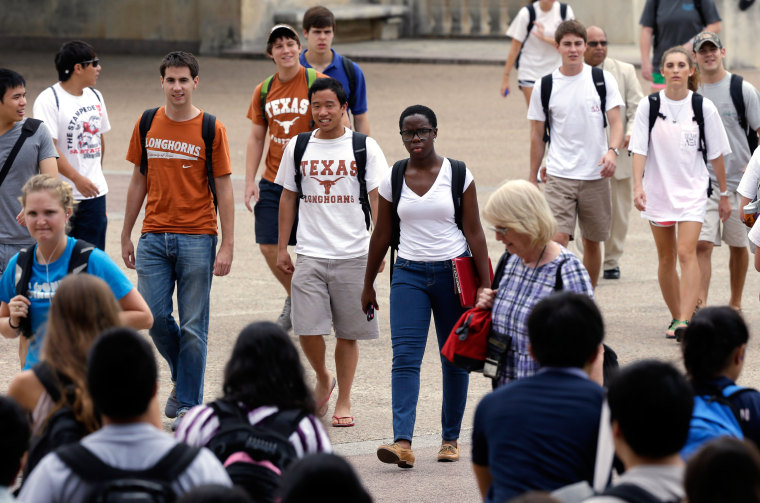As student loan debt plays a growing role in the gap between America’s haves and have-nots, new research suggests that imbalance could make it even harder for young minorities to climb the income ladder.
That black college students bear a greater student loan debt burden than their white peers is no surprise, but a new academic paper published in the March issue of the journal Race and Social Problems finds that this imbalance continues all the way up to top income levels. Higher education experts say this has significant implications for these young adults’ financial futures, and magnifies the risk that the next generation of African-Americans could slip out of the middle class.
“We’re in an environment where college opportunity isn’t something that everyone can count on equally… even among well-prepared students,” said Lauren Asher, president of The Institute for College Access and Success.
African-American students who earn bachelor’s degrees are more likely to graduate with loans, and have higher average loan balances than white students who take on debt to finance their education.
The discrepancy goes all the way to the top, the new research found. Even in the highest slice of the income spectrum, the families of African-American college students have a lower average net worth, with less home equity, retirement savings and other assets. As a result, the study’s authors conclude that parental wealth helps insulate white students, but not black ones, from the effects of debt.
Read More: Ex-Students With 'Income-Based' Loan Payments Face Crushing Tax Bill
Although black families in the top quintile of income distribution had an average of about $2,000 more invested in college savings accounts than white families in the same income bracket, they also had an average of roughly $92,500 in home equity and $92,000 in retirement savings, compared to just under $155,000 and $117,000, respectively, for wealthy white families.
The researchers drew on data compiled by the Bureau of Labor Statistics.
“The wealthiest blacks — they’re doing well, but they’re also trying to secure their own financial standing,” said Fenaba R. Addo, assistant professor of consumer science at the University of Wisconsin-Madison, and one of the study’s authors.
“The people that are able to give, do give to their children,” she said, but added that this ability to fund a child’s education was more constrained for African-American parents. “There are such large inequalities in wealth ... the amount you’re able to give may be significantly lower.”
Aside from the lower average net worth among even well-off African-Americans, Addo said the type of wealth these families hold plays a role in student debt accumulation.
“Most of the wealth is held in homeownership, in home equity, rather than having these accessible financial assets like stocks,” she said. White families in the top fifth of the income distribution also had roughly $35,000 more in financial assets such as savings accounts.
“The transfer of wealth from one generation to the next seems to be greater for white households than black households,” said Beth Akers, fellow at the Brookings Institution’s Center on Children and Families. “Historically, home equity was easy to tap into as a source for college, but that’s not the case anymore.”
“Black students aren’t benefitting as much from their parents’ wealth,” she said.
On average, 86 percent of African-American students who obtained a bachelor’s degree graduated with debt, and the average debt load was just over $33,000, according to TICAS. Among all bachelor’s degree earners, 71 percent graduated with debt, and the average debt load was $29,395.
This continues to hurt students after they graduate. At 25, white young adults had an average net worth of just under $37,200, some $17,000 more than their African-American peers, and earned an average of about $5,000 more annually.
Read More: Corinthian Students Face Tough Choice to Discharge Loans
Addo said discriminatory hiring and employment practices that push even well-educated young African-Americans into underemployment makes it even harder for them to catch up and eliminate that lingering debt.
“It’s not just how much you owe, but the kinds of loans you have and your economic prospects,” Asher said. “We’ve had a long time of states disinvesting in public higher education … but the impact of those costs varies by what resources your family has access to.”
Addo said the racial gap in student debt burdens is representative of a new socioeconomic divide that could potentially have far-reaching consequences.
“It’s an indication of how inequalities are established [and] for recent cohorts of young adults, how racial disparities are starting to be created,” she said. “Even if you are wealthier or have wealthier parents, your status as a black child might not be as secure, even though you’re following all the right steps.”
